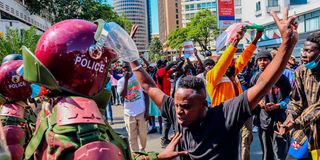Premium
First Russia, then politicians and now Ford Foundation: Who really is behind the youth protests?

A police officer engages with protesters demonstrating along Kenyatta Avenue in Nairobi during anti-Finance Bill demos on June 25, 2024.
What you need to know:
- President William Ruto’s claim added to similar unsubstantiated claims made recently by security agencies.
- The Ford Foundation is the third charity and human rights group to be accused of financing the protests.
Contradicting claims on who the financiers of recent anti-government protests are, have raised doubts as to the quality of intelligence the State is relying on to counter the mass demonstrations.
President William Ruto’s claim on Monday that the American-based charity- Ford Foundation is among those behind youth-led protests against further taxation and poor governance, added to similar unsubstantiated claims made recently by security agencies.
While launching a market in Nakuru County, President Ruto alleged that the 88-year-old American founded charity group could be trying to hound him out of office. He repeated the allegations in an X post.
“We ask the Ford Foundation to explain to Kenyans its role in the recent protests. We will call out all those who are bent on rolling back out hard-won democracy…,” President Ruto said, insinuating that the charity group could be trying to kick him out of office.
Last week, President Ruto dismissed almost his entire Cabinet – in a bid to calm the pressure piled onto his administration by protests which enter a fourth week today (Tuesday).
Prior to that drastic move, former Interior Cabinet Secretary (CS) Kithure Kindiki and his Defence counterpart Aden Duale insisted that investigations into alleged financing of the protests, were nearly complete and suspects would be arraigned soon. Mr Duale gave a 10-day timeline on July 4.
On Monday, Police Spokesperson Resila Onyango said that she is not aware of any investigation into alleged financiers or organisers of the protests.
“I have no idea. I will find out from Directorate of Criminal Investigations (DCI) if they have such a case under investigation,” Dr Onyango said.
Calls to DCI Mohamed Amin did not go through, and he did not respond to our text messages seeking to confirm if there is such an investigation and whether any actionable evidence has been found, implicating any of the institutions accused in the last four weeks.
The Ford Foundation is the third charity and human rights group to be accused of financing the protests.

A protester displays posters during anti-finance bill demonstrations on Moi Avenue, Nairobi on June 18, 2024.
On July 2, an intelligence brief seen by the Nation indicated that six politicians, a businessman and two international NGOs were on the government’s radar for allegedly financing the protests.
The investigation was at that point yet to yield any evidence, despite scrutiny of numerous bank accounts and mobile money platforms of numerous individuals.
The Nation cannot name the two NGOs for legal reasons. But when reached for comment on the matter, one of the NGOs said it did not wish to engage the government in a back and forth over false allegations.
On June 22, the entire country was on tenterhooks as Parliament, only three days from final deliberations on the controversial Finance Bill, despite youth-led protests against further taxation introduced by the controversial budget plan.
There had already been two days of protests that week, against the Finance Bill, and the movement was gathering steam and numbers.
Government spokesperson Isaac Mwaura hurriedly released a statement, seemingly in a bid to discourage people from protesting on June 25.
By this time, the protests had morphed from being just about the Finance Bill and the budget, it was to support, to a near-forensic audit of the loose governance structures that have enriched a handful of politicians and their cronies, at the expense of overburdened taxpayer.
Despite not mentioning specific names, Mr Mwaura came very close to accusing Russia, creditors like the IMF and other institutions of financing the protests.
“The other day he talked about the Russian invasion and how it has disrupted Kenya’s access to grains and wheat, some people are not happy with that. He has been calling for a change in the financial architecture they don’t want us to get out of that slavery…,” Mr Mwaura said.
“Our President has said a lot of things on the international front including climate change. He has rallied the whole of Africa to come together and maybe some people are not happy,” the government spokesperson added.
Mr Mwaura did not speak to any evidence supporting his, and the government’s, accusations.
But his address did not do much, as thousands of youth turned up for the June 25 protests. A group managed to breach Parliament, literally eat lawmakers’ lunch, and even make away with a ceremonial mace from the complex.
That evening, President Ruto addressed the nation on the protests for the first time.
In his speech, he said that the protests were “infiltrated and hijacked by a group of organised criminals” whom he did not name. The statement angered youth, who felt that they still had not been heard.
President Ruto ordered that the Kenya Defence Forces be deployed to contain the protests, as he vowed to crack down on unnamed individuals allegedly sponsoring the anti-government demonstrations.
“I hereby put on notice planners, financiers, orchestrators, abettors of violence and anarchy,” President Ruto said.
Dozens of people believed to be critical to the protests were also abducted by security agencies, but no evidence of financing or planning by any of the suspects was forthcoming.






